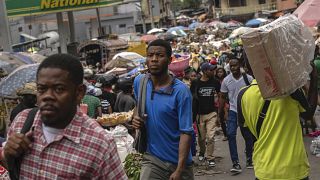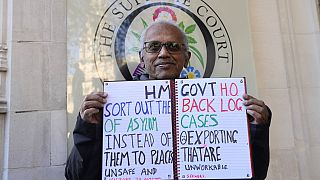United Kingdom
An apex predator, created in vibrant florals.
Florists and gardeners are putting the finishing touches to this lion installation at the Royal Botanic Gardens, Kew.
The huge sculpture is the centrepiece of Kew annual orchid festival.
Planning for the event began last summer.
For the last three weeks, five Kew gardeners and an army of almost 1,000 volunteers have been setting up the vivid displays.
Thousands of orchids shipped in from the Netherlands have been used to decorate the Princess of Wales Conservatory.
“We have 6,200 plants that got brought for the orchid festival. Within those, 3,200 are orchids and you have mainly phalaenopsis orchids and cymbidiums. Those orchids have been bred for many years and we have a varied choice of colours and shapes for our design,” says Solene Dequiret, supervisor of the Princess of Wales Conservatory, Royal Botanic Gardens, Kew.
This year, the theme of the festival is Cameroon.
It’s the first time an African nation has provided the inspiration for this event.
The country’s influence can be seen in animal sculptures dotted around the conservatory - a wallowing hippo, a crocodile ready to snap, or a giraffe with its head in the clouds.
But the Cameroonian flavour goes deeper than these animals.
“So we took inspiration from the native fauna and flora of Cameroon, but also from their huge diversity, melting pot of communities. There is over 250 different communities in Cameroon and chefferies (chiefdoms). And they have amazing artwork, beaded artwork. So we took this inspiration of the bead for our necklace of orchids. And also they've got fabric and all those colours. We took that as an inspiration for the palette of colour we used,” says Dequiret.
A photography exhibition sits alongside the flowers.
These photographs are by Yvon Ngassam and capture life in the village of Bikoka, Lolodorf in Cameroon.
They are part of the Bikoka Art Project, an art initiative for women and young people from the country.
The exhibition has been curated by art critic and historian Christine Eyene.
“The series was taken in Bikoka, which is a really small village, but it's in the forest region. So the region where the photographs have been taken is actually similar to the region where Kew scientists have been doing their research. So there are also a lot of landscapes in the photographs and some of them blend with the nature that is found here at the Princess of Wales Conservatory,” she says.
Wandering through the greenhouse, if you listen carefully, you might hear the sounds of music and other noises.
For Eyene, the whole experience is about putting an African stamp on Kew’s orchid festival.
”Really it's about in a way the Black presence at Kew Gardens and in this conservatory. There's also a soundscape that goes with the exhibition. So it's about the sound from our culture and we want people to sort of be immersed in the sonic environment that they would get if they were going to Cameroon,” says Eyene.
Kew’s orchid collection holds about 1,300 species - a fraction of the 25,000 that have been discovered around the world.
Wild orchids are under threat.
Professor Michael Fay, an orchid expert and Senior Research Leader at Kew, says Cameroon’s orchids are doing no better.
“Cameroon has about just over 400 species of wild orchids. And we know where we are with about 25% of those. And they have about the same level of threats as orchids worldwide, so that somewhere between 60 and 70% of them are threatened with extinction in the wild,” he says.
Orchids can be an early indicator of an eco-system in trouble.
They are dependent on fungi which provide them with food, as well as a variety of pollinators.
So when orchids start to die off, it’s a sign that another part of that complex chain which supports them could also be in danger.
In Cameroon, orchids face a very particular set of threats.
“Orchids in general are more threatened than plants on average. And depending on the part of the world we're talking about, then the threats can be different. So many orchids in Asia, for example, are collected for traditional medicines. In southern Africa, many of them are collected for food,” says Fay.
“But in places like Cameroon, the threats are rather different. And that's largely due to conversion of land for agriculture, destruction of forests. And increasingly we're worried about climate change, of course.”
This is the 27th orchid festival at Kew.
It runs from 4 February until 5 March 2023.













02:20
Cameroon opens museum honouring one of its oldest and most influential kingdoms
02:20
Morocco: Arabic calligraphy exhibition celebrates Islamic heritage
02:20
Remake of 'Don’t Tell Mom the Babysitter’s Dead' released this week
Go to video
Cameroon: Sports ministry signs new coach, controversy endures
02:20
Inedible for some, delicious for others: inside Berlin's 'Disgusting food' museum
02:02
Cameroon: Football fans react to the controversy over appointment of new coach